最新高中情态动词练习题及答案详解
高中情态动词练习题及答案详解
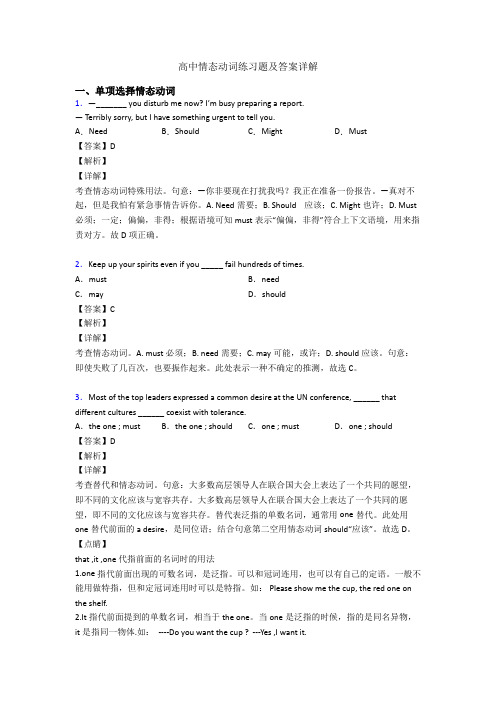
高中情态动词练习题及答案详解一、单项选择情态动词1.—_______ you disturb me now? I’m busy preparing a report.— Terribly sorry, but I have something urgent to tell you.A.Need B.Should C.Might D.Must【答案】D【解析】【详解】考查情态动词特殊用法。
句意:—你非要现在打扰我吗?我正在准备一份报告。
—真对不起,但是我怕有紧急事情告诉你。
A. Need需要;B. Should 应该;C. Might也许;D. Must 必须;一定;偏偏,非得;根据语境可知must表示“偏偏,非得”符合上下文语境,用来指责对方。
故D项正确。
2.Keep up your spirits even if you _____ fail hundreds of times.A.must B.needC.may D.should【答案】C【解析】【详解】考查情态动词。
A. must必须;B. need需要;C. may可能,或许;D. should应该。
句意:即使失败了几百次,也要振作起来。
此处表示一种不确定的推测,故选C。
3.Most of the top leaders expressed a common desire at the UN conference, ______ that different cultures ______ coexist with tolerance.A.the one ; must B.the one ; should C.one ; must D.one ; should【答案】D【解析】【详解】考查替代和情态动词。
句意:大多数高层领导人在联合国大会上表达了一个共同的愿望,即不同的文化应该与宽容共存。
大多数高层领导人在联合国大会上表达了一个共同的愿望,即不同的文化应该与宽容共存。
高中英语情态动词形式练习题40题带答案解析

高中英语情态动词形式练习题40题带答案解析1.She ______ play the piano beautifully when she was only seven.A.canB.couldC.mayD.might答案解析:B。
“could”表示过去的能力,句中“when she was only seven”表明是过去的时间,所以用“could”。
“can”表示现在的能力;“may”和“might”表示可能性较小的推测,不符合题意。
2.You ______ borrow my book if you promise to return it on time.A.canB.mayC.mustD.should答案解析:A。
“can”在这里表示许可,“如果你承诺按时归还,你可以借我的书”。
“may”也有许可的意思,但语气比“can”弱;“must”表示必须;“should”表示应该,都不符合许可的意思。
3.He said he ______ speak three languages.A.canB.couldC.mayD.might答案解析:B。
“could”表示过去的能力,“said”表明是过去时态。
“can”是现在的能力;“may”和“might”表示可能性较小的推测。
4.Mom said I ______ go to the party if I finish my homework.A.canB.mayC.mustD.should答案解析:A。
“can”表示许可,“如果我完成作业,妈妈说我可以去参加聚会”。
“may”语气较弱;“must”是必须;“should”是应该。
5.She ______ swim very well last summer.A.canB.couldC.mayD.might答案解析:B。
“last summer”是过去的时间,“could”表示过去的能力。
“can”是现在的能力;“may”和“might”表示可能性较小的推测。
英语情态动词含答案解析
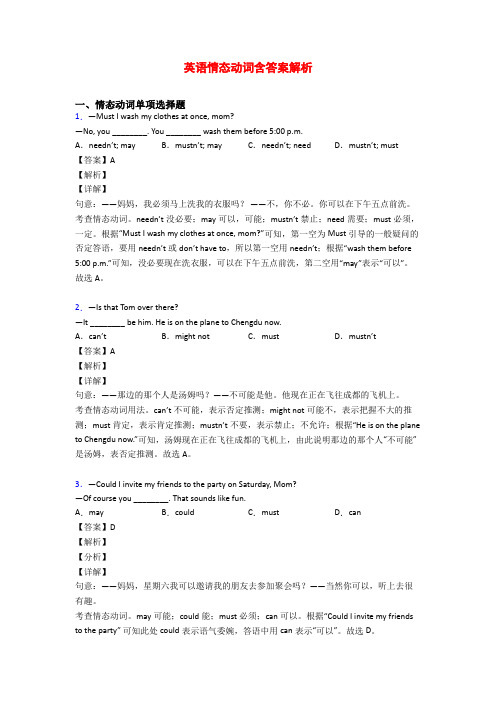
英语情态动词含答案解析一、情态动词单项选择题1.—Must I wash my clothes at once, mom?—No, you ________. You ________ wash them before 5:00 p.m.A.needn’t; may B.mustn’t; may C.needn’t; need D.mustn’t; must【答案】A【解析】【详解】句意:——妈妈,我必须马上洗我的衣服吗?——不,你不必。
你可以在下午五点前洗。
考查情态动词。
needn’t没必要;may可以,可能;mustn’t禁止;need需要;must必须,一定。
根据“Must I wash my clothes at once, mom?”可知,第一空为Must引导的一般疑问的否定答语,要用needn’t或don’t have to,所以第一空用needn’t;根据“wash them before 5:00 p.m.”可知,没必要现在洗衣服,可以在下午五点前洗,第二空用“may”表示“可以”。
故选A。
2.—Is that Tom over there?—It ________ be him. He is on the plane to Chengdu now.A.can’t B.might not C.must D.mustn’t【答案】A【解析】【详解】句意:——那边的那个人是汤姆吗?——不可能是他。
他现在正在飞往成都的飞机上。
考查情态动词用法。
can’t不可能,表示否定推测;might not可能不,表示把握不大的推测;must肯定,表示肯定推测;mustn’t不要,表示禁止;不允许;根据“He is on the plane to Chengdu now.”可知,汤姆现在正在飞往成都的飞机上,由此说明那边的那个人“不可能”是汤姆,表否定推测。
故选A。
3.—Could I invite my friends to the party on Saturday, Mom?—Of course you ________. That sounds like fun.A.may B.could C.must D.can【答案】D【解析】【分析】【详解】句意:——妈妈,星期六我可以邀请我的朋友去参加聚会吗?——当然你可以,听上去很有趣。
高考英语最新情态动词知识点专项训练及解析答案

高考英语最新情态动词知识点专项训练及解析答案一、选择题1.She looks very happy. She_________ the exam.A.can have passed B.should have passed C.must have passed D.could have passed 2.—Can I pay the bill by check?—Sorry,sir.But it is the management rules of our hotel that payment _____ be made in cash.A.shall B.needC.will D.can3.They worked hard day and night during the next ten years ________ they ________ pay for the lost necklace.A.so…would B.so that…would C.in order that…could D.and…would4.If you behave well from now on, you ___ have an Apple Watch for your 18th birthday. A.will B.shall C.can D.must 5.According to the regulations, anyone who has the intention to be a teacher _______ pass a series of demanding tests.A.can B.would C.might D.shall6.No student ______go out of school after eleven o’clock at night without the teacher’s permission.A.will B.must C.may D.shall7.Peter searched all the places where he________have left her iPad but it was all in vain. A.might B.would C.must D.should8.You ___________ a better mark, b ut you didn’t work hard.A.could have had B.would have had C.must have had D.must have9.You don’t look well, you __________ see the doctor.A.ought to B.mayC.can D.might10.—You look so tired. You________ late last night.—Yes. I had to to do an important report and stayed up till I completed it.A.should sleep B.must sleepC.should have slept D.must have slept11.(2018·天津) I can't find my purse. I___________ it in the supermarket yesterday, but I'm not sure.A.should leave B.must have leftC.might leave D.could have left12.Schools have been lengthening the school day to raise test marks, which ________ be costly if schools need air conditioning on hot days.A.might B.can C.dare D.need13.Louis Cha (金庸) passed away. As for his achievement, there is such a comment, “He ______ the Nobel Prize for Literature with his written works translated into English.”A.could have been rewarded B.must have been rewardedC.should be rewarded D.need have been rewarded14.He did not regret saying what he did but felt that he _________ it differently.A.could express B.would expressC.could have expressed D.must have expressed15.One of our rules is that every student _______ wear school uniform while at school. A.might B.couldC.shall D.will16.The lady ________ have done something wrong, because she is looking guilty.A.would B.should C.can D.must17.We lost our way in that small village, otherwise we ________more places of interest yesterday.A.visited B.had visitedC.would visit D.would have visited18.There’s no light on --- they _______ be at home.A.can’t B.mustn’t C.needn’t D.wouldn’t 19.Word that you _________ enjoy a three-day holiday has come if you do complete the task on time.A.may B.should C.could D.shall20.—Do you know where Tony is?—He _________ in the living room. I saw him there just now.A.shall be B.should have been C.might have been D.must be 21.—Sorry, Mum! I failed the job interview again.—Oh, it's too bad. You________ have made full preparations.A.must B.can C.would D.should22.It was so noisy that we hear ourselves speak.A.couldn’t B.shouldn’tC.mustn’t D.needn’t23.The heavy rain may ______ the landslide last night.A.accounts for B.accounted forC.have accounted for D.accounting for24.—May I smoke here?—If you _______, choose a seat in the smoking section.A.must B.should C.may D.can25.I still remember my happy childhood when my mother ___________ take me to Disneyland at weekends.A.might B.mustC.would D.should【参考答案】***试卷处理标记,请不要删除一、选择题1.C解析:C【解析】【分析】【详解】考查情态动词。
高考情态动词单选20题答案解析版

高考情态动词单选20题答案解析版1. She ______ know the answer. She always gets good grades in English.A.mustB.canC.mayD.could答案:A。
选项A“must”表示肯定的推测,意为“一定”,根据后句她英语总是得高分,可以推断她一定知道答案。
选项B“can”表示能力,“能、会”;选项C“may”表示可能性较小的推测,“可能”;选项D“could”表示过去的能力或委婉的请求等。
2. You ______ finish your homework before you watch TV.A.mustB.canC.mayD.could答案:A。
“must”在这里表示“必须”,在看电视之前必须完成作业。
选项B“can”表示能力或允许;选项C“may”表示可能或允许;选项D“could”表示过去的能力或委婉的请求等。
3. He ______ be at home. I just saw him go out.A.mustn'tB.can'tC.may notD.couldn't答案:B。
“can't”表示否定的推测,“不可能”,因为刚刚看到他出去了,所以他不可能在家。
选项A“mustn't”表示禁止;选项C“may not”表示可能性较小的否定推测;选项D“couldn't”表示过去的否定推测,语气比“can't”弱。
4. —______ I use your pen?—Sure. Here you are.A.MustB.CanC.MayD.Could答案:B。
这里表示请求,“我能使用你的钢笔吗?”“can”可以用于请求允许。
选项A“must”表示必须;选项C“may”也可以用于请求允许,但语气比“can”弱;选项D“could”用于委婉的请求。
5. She ______ have forgotten to bring her book. She is always very careful.A.mustn'tB.can'tC.may notD.couldn't答案:B。
英语情态动词题20套(带答案)含解析
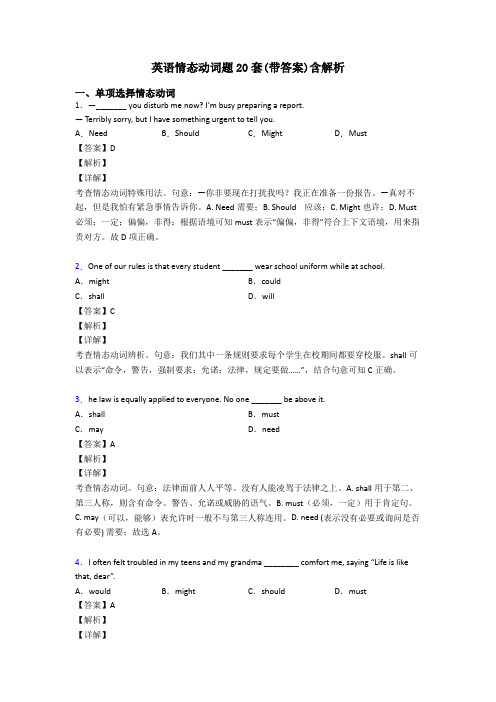
【解析】
【详解】
考查must have done结构。句意:——吉姆一定觉得我说的话很让人烦,尽管他什么也没说。——所以你是说你得向他道歉?根据“though he didn’t say anything.”可知此处表示对过去事情的肯定推测,用must have done表示“过去一定做了……”,故D项正确。
2、should作为情态动词,可以用在条件状语从句中,表示语气较强的假设,译作“万一”、“竟然”,这时也可将should置于从句之首,即将should放在主语前面,而省略从属连词if。例如:If you should fail to come, ask Mrs Chen to work in your place.(= Should you fail to come, ask Mrs Chen to work in your place.)
A.mayB.canC.mustD.ould
【答案】C
【解析】
【详解】
考查情态动词表猜测的用法。句意:一定是汤姆把车停在这儿的,因为他是唯一有车的人。A. may可能;B. can可能;C. must一定;D. should应该。由as he is the only one with a car.可知一定是他把车停在这里的,非常有把握的肯定推测,故选C。
2.One of our rules is that every student _______ wear school uniform while at school.
A.mightB.could
C.shallD.will
【答案】C
【解析】
【详解】
考查情态动词辨析。句意:我们其中一条规则要求每个学生在校期间都要穿校服。shall可以表示“命令,警告,强制要求;允诺;法律,规定要做……”,结合句意可知C正确。
高中英语情态动词形式练习题40题含答案解析
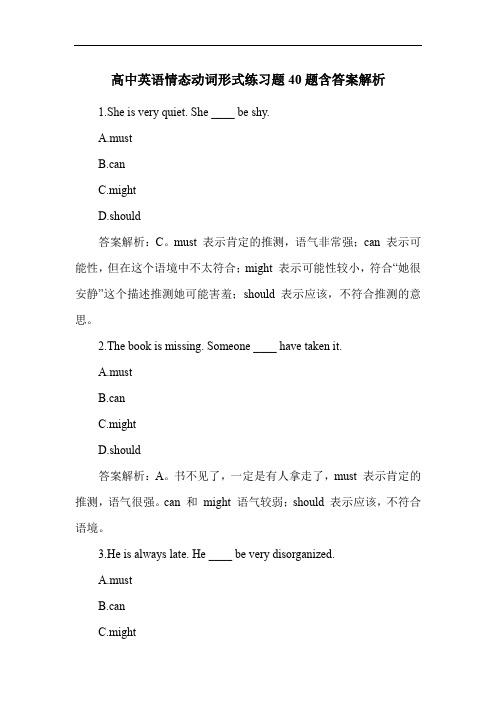
高中英语情态动词形式练习题40题含答案解析1.She is very quiet. She ____ be shy.A.mustB.canC.mightD.should答案解析:C。
must 表示肯定的推测,语气非常强;can 表示可能性,但在这个语境中不太符合;might 表示可能性较小,符合“她很安静”这个描述推测她可能害羞;should 表示应该,不符合推测的意思。
2.The book is missing. Someone ____ have taken it.A.mustB.canC.mightD.should答案解析:A。
书不见了,一定是有人拿走了,must 表示肯定的推测,语气很强。
can 和might 语气较弱;should 表示应该,不符合语境。
3.He is always late. He ____ be very disorganized.A.mustB.canC.might答案解析:A。
他总是迟到,肯定是非常没有条理,must 表示肯定的推测,语气强。
can 和might 可能性较小;should 表示应该,不合适。
4.The lights are on. Someone ____ be at home.A.mustB.canC.mightD.should答案解析:A。
灯亮着,肯定有人在家,must 表示肯定的推测,语气强。
can 和might 可能性较小;should 表示应该,不符合语境。
5.The test was very difficult. She ____ have passed it.A.mustB.canC.mightD.should答案解析:C。
考试很难,她可能通过了,might 表示可能性较小。
must 语气太强;can 表示可能性,但不太符合这个语境;should 表示应该,不符合推测的意思。
6.He looks very tired. He ____ have worked hard.A.mustB.canD.should答案解析:A。
高考情态动词练习题及答案详解

高考情态动词练习题及答案详解一、单项选择情态动词1.Look! There are so many mistakes in your composition. You ________ have fixed full attention on it.A.can B.shouldC.need D.might【答案】B【解析】【详解】考查情态动词。
句意:看!你的作文里有那么多的错误。
你本应该把所有的注意力都集中在它上面的。
表示“本应该做但实际上没有做”应该用should have done结构,can have done 表示可能;need表示需要;might have done表示可能做过某事;故选B。
2.—I don’t really like Janes. Why did you invite him?—Don’t worry. He come. He said he was’t certain what his plans were.A.must not B.need not C.would not D.might not【答案】D【解析】考察情态动词,题干中的h e wasn’t certain说明他可能不来,可能来,因此使用不完全否定,might not。
3.-- Did Jim come?-- I don’t know. He _______ while I was out.A.might have come B.might comeC.must have come D.should have come【答案】A【解析】【详解】考查情态动词推测用法。
句意:Jim来了吗?--我不知道,在我不在的时候,可能来过。
根据前文I don’t know.可知,说话者不知道Jim来没来,因此后文推测来过,但是语气很不确定,故可知选A。
对过去情况的推测为情态动词+have done,must have done 一定做了某事,should have done 应该来过,不符合,故选A。
高中英语情态动词常见题型及答题技巧及练习题(含答案)及解析

高中英语情态动词常见题型及答题技巧及练习题(含答案)及解析一、单项选择情态动词1.I often felt troubled in my teens and my grandma ________ comfort me, saying “Life is like that, dear”.A.would B.might C.should D.must【答案】A【解析】【详解】考查情态动词。
句意:在我十几岁的时候,我经常感到烦恼,我的奶奶会安慰我说,“生活就是这样,亲爱的”。
此处是would+动词原形,表示“过去总是做某事”。
故选A。
2.—I feel a little nervous.—Take it easy. You __________ have difficulty passing the exam when you have prepared for it well.A.mustn’t B.needn’t C.may not D.shouldn’t【答案】D【解析】【详解】考查情态动词。
句意:——我觉得有点紧张。
——不要着急。
当你准备充分时,通过考试应该不会有困难。
A. mustn’t禁止,不允许;B. needn’t不必;C. may not可能不会;D. shouldn’t不应该。
结合句意可知答案为D。
3.—It’s already 11 o’clock , and he ______ have been here half an hour ago.—Maybe he got caught in the rain.A.must B.ought toC.may D.can【答案】B【解析】【详解】考查情态动词。
句意:已经11点了,他半小时前就该到了。
A. must have done必定做了…(表示对过去的推测);B. ought to have done 本应该做的;C. may have done可能已经做过某事;D. can have done本来可以做的(但没有做),根据题意,故选B。
高考英语情态动词单选题30题

高考英语情态动词单选题30题1.She be very tired after such a long journey. She has been on the road for over ten hours.A.mustB.canC.shouldD.need答案:A。
本题主要考查情态动词表示推测的用法。
“must”表示非常肯定的推测,根据后文她已经在路上走了十多个小时,所以一定很累。
“can”表示可能性,一般用于否定句或疑问句中表示推测。
“should”表示应该,通常表示一种责任或义务,不是推测。
“need”表示需要,不是推测的用法。
2.The weather forecast said it rain tomorrow, but it's not certain.A.mightB.mustC.shouldD.will答案:A。
“might”表示可能性较小的推测。
天气预报说明天可能下雨,但不确定,所以用“might”。
“must”表示非常肯定的推测,不符合语境。
“should”表示应该,不是推测的用法。
“will”表示将来会发生的事情,不是推测。
3.The door is locked. He be at home.B.mustn'tC.shouldn'tD.needn't答案:A。
“can't”表示否定的推测,意为“不可能”。
门是锁着的,所以他不可能在家。
“mustn't”表示禁止,不是推测的用法。
“shouldn't”表示不应该,不是推测的用法。
“needn't”表示不需要,不是推测的用法。
4.There is a lot of noise coming from the classroom. The students be having a party.A.mustB.canC.shouldD.would答案:A。
“must”表示非常肯定的推测。
高中情态动词试题及答案解析
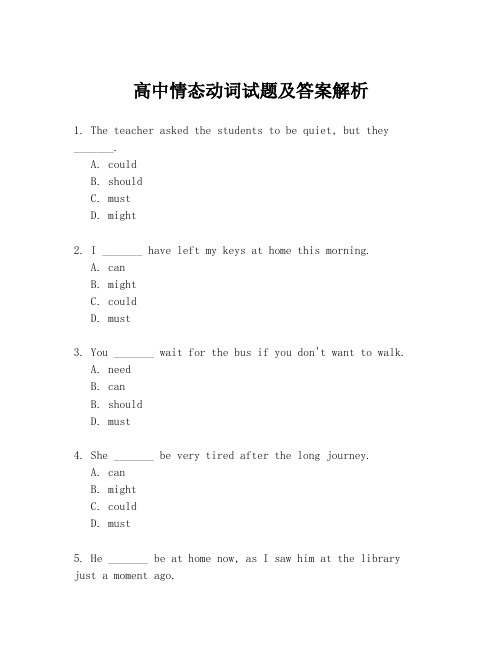
高中情态动词试题及答案解析1. The teacher asked the students to be quiet, but they_______.A. couldB. shouldC. mustD. might2. I _______ have left my keys at home this morning.A. canB. mightC. couldD. must3. You _______ wait for the bus if you don't want to walk.A. needB. canB. shouldD. must4. She _______ be very tired after the long journey.A. canB. mightC. couldD. must5. He _______ be at home now, as I saw him at the library just a moment ago.B. mustn'tC. shouldn'tD. needn't6. _______ I go to the meeting tomorrow?A. MustB. CanC. ShouldD. May7. You _______ not have finished your homework if you are watching TV now.A. can'tB. mustn'tC. shouldn'tD. needn't8. _______ I borrow your dictionary for a while?A. MayB. MustC. ShallD. Will9. They _______ have known the news before we told them.A. can'tB. couldn'tC. might notD. mustn't10. _______ you pass me the salt, please?B. CouldC. MayD. Must答案解析1. 正确答案:D. might解析:根据句意“老师要求学生们安静,但他们可能没有”,这里表示可能性,故选might。
情态动词用法专项训练及答案解析
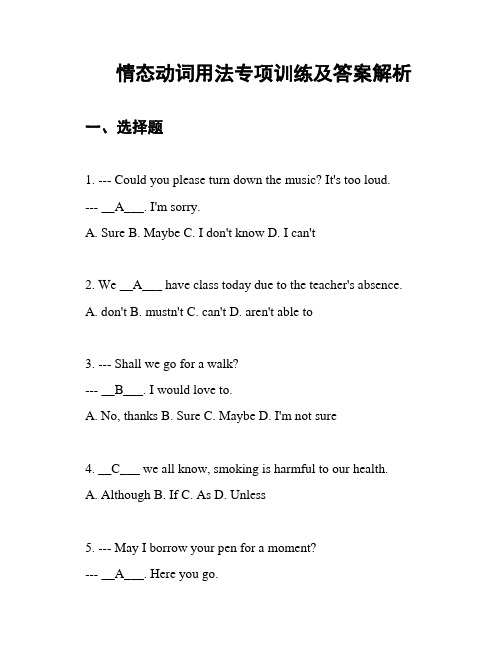
情态动词用法专项训练及答案解析一、选择题1. --- Could you please turn down the music? It's too loud.--- __A___. I'm sorry.A. SureB. MaybeC. I don't knowD. I can't2. We __A___ have class today due to the teacher's absence.A. don'tB. mustn'tC. can'tD. aren't able to3. --- Shall we go for a walk?--- __B___. I would love to.A. No, thanksB. SureC. MaybeD. I'm not sure4. __C___ we all know, smoking is harmful to our health.A. AlthoughB. IfC. AsD. Unless5. --- May I borrow your pen for a moment?--- __A___. Here you go.A. Of courseB. Never mindC. Not reallyD. I'm afraid not二、填空题1. You ___B___ take an umbrella with you in case it rains.2. I ___D___ go to bed early last night because I had a tiring day.3. She ___A___ be very young, but she is already a successful entrepreneur.4. He ___C___ be at the meeting at 2 pm sharp, so don't be late.5. We ___D___ go to the supermarket after work to buy some groceries.三、改错题1. I should to study harder for my exams. ❌Correction: I should study harder for my exams.2. You must to follow the rules in this building. ❌Correction: You must follow the rules in this building.3. She can made a delicious cake for her birthday. ❌Correction: She can make a delicious cake for her birthday.4. He shouldn't to eat too much junk food if he wants to lose weight. ❌Correction: He shouldn't eat too much junk food if he wants to lose weight.5. You might to ask the teacher for help if you don't understand the assignment. ❌Correction: You might ask the teacher for help if you don't understand the assignment.四、解析1. The correct answer for question 1 is A. "Sure" is an appropriate response to someone asking you to turn down the music.2. The correct answer for question 2 is A. "Don't" is the correct choice to express that there is no class today.3. The correct answer for question 3 is B. "Sure" is a positive response to the suggestion of going for a walk.4. The correct answer for question 4 is C. "As" is used to introducea reason or cause, and in this case, it is used to introduce the reason why smoking is harmful.5. The correct answer for question 5 is A. "Of course" is a polite response when someone asks to borrow something.In the fill-in-the-blank section, the correct answers are:1. should (B)2. couldn't (D)3. may/might (A)4. must (C)5. will (D)In the error correction section, the corrections are provided for each sentence to fix the grammatical mistakes.Please note that the answers and corrections provided are based on general knowledge and understanding of modal verbs. It is always a good idea to consult grammar guides and language references for more detailed explanations and examples.。
情态动词专项练习(含答案和解析)

情态动词专项练习(含答案和解析)1.Our XXX.2.To my joy。
we don't need to go to the bank。
Mary has lent us some money.3.- Do we have to finish this today?Yes。
you must。
Today is the last day.4.Sorry。
smoking is not allowed here。
If you do。
you will be fined according to the rules.5.- Is it really necessary for me to wear a mask when shopping?I'm afraid you must in public。
It is not only to XXX.6.Hurry up。
or we will miss the beginning of the film.7.- How do you like my new dress?Well。
if I must say。
it is not suitable for you.8.- Do the children have to leave at six tomorrow morning?16."Please don't make so much noise。
I can't hear the speaker very well."17."We've discussed every detail of this plan and have got everything ready。
But still something may go wrong。
We still have to be very careful."18."XXX。
情态动词详解(含练习题100道和答案)
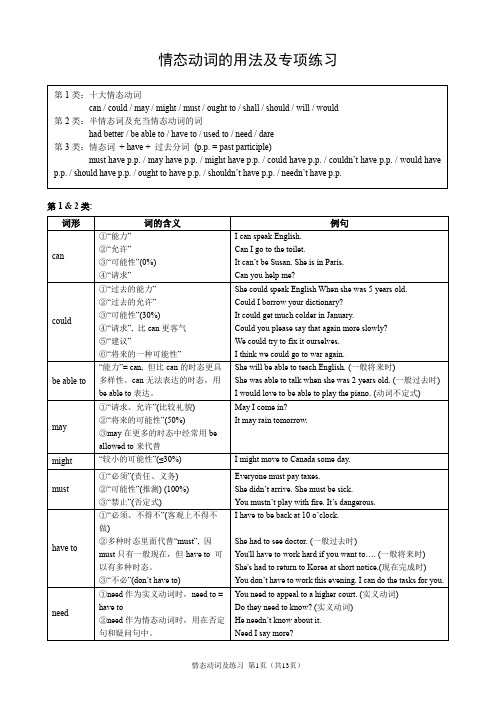
情态动词的用法及专项练习第1 & 2类:第3类:1.could have p.p.①指过去某事有可能发生, 但并未.真的..发生。
They could have won the race, but they didn't try hard enough.He could have studied harder, but he was too lazy and that's why he failed the exam.②指过去有能力做某事, 但并未真的...做过。
I could have stayed up late, but I decided to go to bed early.Julie could have bought the book, but she borrowed it from the library instead.③对过去的发生事情做出一种猜测,但实际上并不知道真假。
仅仅是做一种观点上的表达。
He could have got stuck in traffic.He could have forgotten that we were meeting today.He could have overslept.2. may / might have p.p.(用法与could have p.p.第③点相同)对过去的发生事情做出一种猜测,但实际上并不知道真假。
仅仅是做一种观点上的表达。
He might have got stuck in traffic.He might have forgotten that we were meeting today.He might have overslept.3. couldn't have p.p.渴望、期望做某事, 但由于外部原因不可能做成, 即便是很想做。
是一种虚拟语气。
I couldn't have arrived any earlier. There was a terrible traffic jam (= it was impossible for me to have arrivedany earlier).He couldn't have passed the exam, even if he had studied harder. It's a really, really difficult exam.4. should / ought to have p.p.有一个好主意,该做而没有做。
高考情态动词单选20题(含答案)
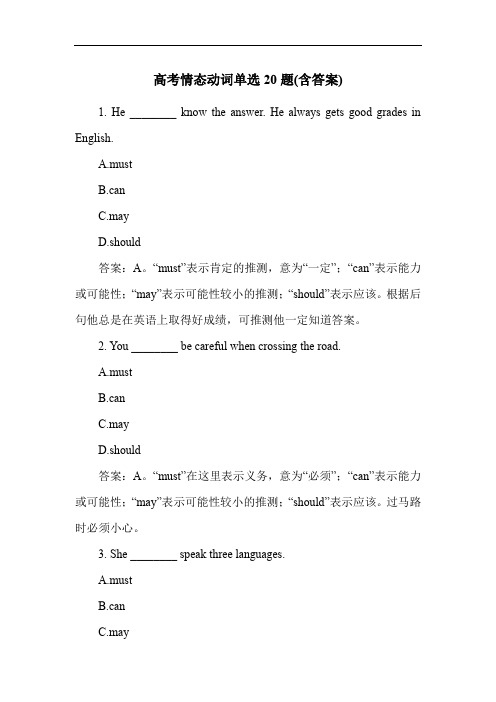
高考情态动词单选20题(含答案)1. He ________ know the answer. He always gets good grades in English.A.mustB.canC.mayD.should答案:A。
“must”表示肯定的推测,意为“一定”;“can”表示能力或可能性;“may”表示可能性较小的推测;“should”表示应该。
根据后句他总是在英语上取得好成绩,可推测他一定知道答案。
2. You ________ be careful when crossing the road.A.mustB.canC.mayD.should答案:A。
“must”在这里表示义务,意为“必须”;“can”表示能力或可能性;“may”表示可能性较小的推测;“should”表示应该。
过马路时必须小心。
3. She ________ speak three languages.A.mustB.canC.may答案:B。
“can”表示能力,意为“能够”;“must”表示肯定的推测或义务;“may”表示可能性较小的推测;“should”表示应该。
她能说三种语言,强调能力。
4. He ________ come to the party. He said he was busy.A.mustn'tB.can'tC.may notD.shouldn't答案:B。
“can't”表示否定的推测,意为“不可能”;“mustn't”表示禁止;“may not”表示可能性较小的否定推测;“shouldn't”表示不应该。
他说他很忙,所以不可能来参加聚会。
5. We ________ study hard to get good grades.A.mustB.canC.mayD.should答案:A。
“must”表示义务,意为“必须”;“can”表示能力或可能性;“may”表示可能性较小的推测;“should”表示应该。
高考情态动词练习20题

高考情态动词练习20题1. Tom be at home. I just saw him go out.A.mustn'tB.can'tC.needn'tD.shouldn't答案解析:B。
“can't”表示“不可能”,符合语境,因为刚刚看到汤姆出去了,所以他不可能在家。
“mustn't”表示“禁止”;“needn't”表示“不必”;“shouldn't”表示“不应该”,这三个选项都不符合题意。
2. You have finished your homework before you watch TV.A.mustB.canC.mayD.need答案解析:A。
“must”表示“必须”,符合题意,即你必须先完成作业才能看电视。
“can”表示“能够”;“may”表示“可以”;“need”表示“需要”,这三个选项都不能准确表达该语境下的义务。
3. She speak three languages fluently.A.mustB.canC.shouldD.need答案解析:B。
“can”表示“能够”,在这里表示她能够流利地说三种语言。
“must”表示“必须”,不符合语境;“should”表示“应该”;“need”表示“需要”,这两个选项也不合适。
4. I be wrong, but I think he is from Canada.A.mayB.mustC.shouldD.need答案解析:A。
“may”表示“可能”,符合语境,即我可能是错的。
“must”表示“一定”,语气太肯定;“should”表示“应该”;“need”表示“需要”,都不符合该语境。
5. You go to school on foot. It's not far.A.mustB.canC.shouldD.need答案解析:B。
“can”表示“可以”,在这里表示你可以步行去上学,因为不远。
(完整版)情态动词专项练习(含答案)
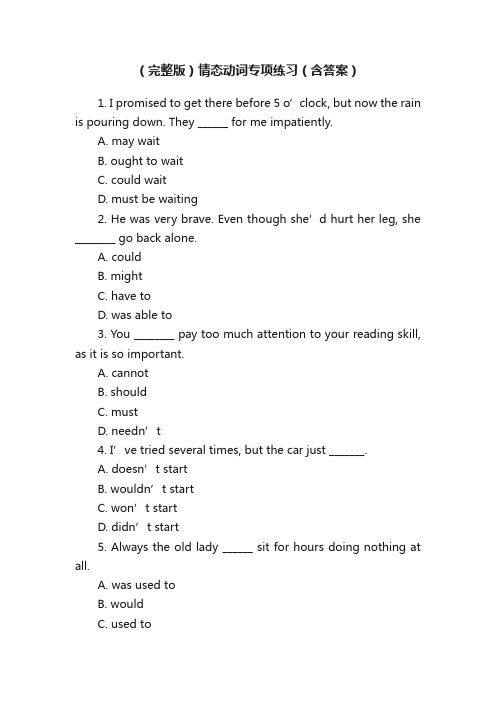
(完整版)情态动词专项练习(含答案)1. I promised to get there before 5 o’clock, but now the rain is pouring down. They ______ for me impatiently.A. may waitB. ought to waitC. could waitD. must be waiting2. He was very brave. Even though she’d hurt her leg, she ________ go back alone.A. couldB. mightC. have toD. was able to3. You ________ pay too much attention to your reading skill, as it is so important.A. cannotB. shouldC. mustD. needn’t4. I’ve tried several times, but the car just _______.A. doesn’t startB. wouldn’t startC. won’t startD. didn’t start5. Always the old lady ______ sit for hours doing nothing at all.A. was used toB. wouldC. used toD. should6. There used to be a small school,___________?A. was thereB. wasn’t itC. usedn’t thereD. usedn’t it7. Our house is on the top of the hill, so in summer the wind _____ be pretty cold.A. mustB. canC. ought toD. need8. Haven’t I told you that you __________ have the ans wer tomorrow morning?A. willB. shallC. shouldD. would9. I’m surprised that he _______ in the match.A. should failB. should have failedC. would have failedD. may have failed10. Better go to see my sick colleague right now, ________I?A. hadn’tB. didn’tC. don’tD. won’t11. Sir, you ______ be hunting deer here, for they are preserved by the government.A. oughtn’t toB. can’tC. won’tD. needn’t12. Sorry I’m late. I ______ have turned off the alarm clock and gone back to sleep again.A. mightB. shouldC. canD. will13. —There were already five people in the car, but they managed to take me as well.— It __________ a comfortable journey.A. can’tB. shouldn’t beC. must have beenD. couldn’t have been14. To be on the safe side, we should fill up the tank now, because we ______ run out of gas on the way.A. canB. wouldC. mightD. should15. ____ three people who travel together, there _____ be at least one who ____ be my teacher.A. Between; can; willB. In; should; couldC. Among; will; mayD. Of; must; can16. —Could you lend me that book you ______ me aboutwhen I telephoned you?—No, I am sorry, I can’t. I gave it to a friend.A. were tellingB. would tellC. had toldD. had been telling17. —We need a person badly to think up such an idea.—_______ the new comer have a try?A. ShallB. MayC. ShouldD. Need18. We ________ so tired. We’ve only been to a party.A. mustn’t have feltB. wouldn’t have feltC. shouldn’t have feltD. couldn’t have felt19. Professor Smith, many students want to see you. __________ they wait here or outside?A. DoB. ShallC. WillD. Would20. —How about paying a visit to Mr. Richardson, our former history teacher?—Good idea. I will e-mail him today so he _____know _________ to expect us.A. shall; whyB. may; whenC. would; whyD. will; how21. —I went to work on foot yesterday, though it _________ cats and dogs.—You __________ by bus. It was likely to get a cold.A. is raining; must have goneB. rained; would goC. was mining; should have goneD. have rained; could have gone22. You ______ pay too much attention to your reading skill, as it is so important.A. cannotB. shouldC. mustD. needn’t23. I told Sally to fix him up with this job, but perhaps I _________ it out for her.A. had to writeB. must have writtenC. should have writtenD. ought to write24. My sister met him at the Grand Theatre yesterday afternoon, so he ________ your lecture.A. couldn’t have attendedB. needn’t have attendedC. mustn’t have attendedD. shouldn’t have attended25. Research findings show we spend about two hours dreaming every night, no matter what we ________ during the day.A. should have doneB. would have doneC. may have doneD. must have done26. —Is there any flight to Tokyo today?— I think there _____, for the weather is too bad.A. mustn’t beB. mightn’t beC. needn’t beD. can’t be27. —I’m told that John had another car accident this morning.— I believe not. He _____ so careless.A. shouldn’t have beenB. wouldn’t have beenC. couldn’t have beenD. mustn’t have be en28. It was playing computer games that cost the boy a lot of time that he __________ doing his lessons.A. might have spentB. ought to have spentC. must have spentD. could have spent29. —I didn’t know you were good friends.—You _______. I have known her since she moved here. You were studying abroad then.A. may haveB. needn’t haveC. couldn’t haveD. must have30. They must have finished the work by the end of last month, __________?A. mustn’t theyB. haven’t theyC. hadn’t theyD. didn’t they31. —I didn’t see her yesterday.— Of course, you _____, because he had gone for a trip.A. can’tB. may not haveC. can’t haveD. mustn’t have32. You ________ phone him if you want to, but you _________. He is sure to phone you.A. may; mustn’tB. have t o; needn’tC. can; doesn’t needD. can; needn’t33. — She must have gone back to the valley.— ______, she _____ have. The entrance to it was nowhere to be found.A. No; mustn’tB. Yes; mightC. Yes; couldD. No; couldn’t34. He _____ full marks, but he was so careless as to make a spelling mistake.A. must have gainedB. can have gainedC. could have gainedD. must gain35. From what you said, she _____ you about it.A. mustn’t have toldB. can’t have toldC. mustn’t tellD. can’t tell36. — You ought to have made an apology to Tom yesterday evening.— Yes, I know I _________.A. ought toB. have toC. should haveD. must have37. —Is there a fog in the evening?—There _______ be. I’ll make a phone call to find it out.A. mustB. wouldC. willD. might38. — _______ he help you with the problem?—Well, though it is very hard, __________ I’ll do what I can to work it out.A. Shall; butB. Can; andC. Must; howeverD. Will; still39. —How is that, Joan?—Yeah, it’s from the boss. She _________ first, whether she likes it.A. shall goB. ought to have goneC. should goD. must have gone40. —Would you like to watch the video, in which you can see foreigners making jiaoji during the Spring Festival?—Sure, it ______ be very interesting.A. shouldB. mayC. canD. will41. —The door was open.—It _________ open. I had locked it myself and the key was in my pocket.A. can not beB. must not beC. can not have beenD. must not have been42. —Where ________ Margaret have put the empty bottles?—She ________ them away. They must be somewhere.A. can; can’t have thrownB. must; needn’tC. must; must have thrownD. cant; must throw43. —Mum, I climbed to get the Teddy Bear from the top of the shelf.—My goodness! You _______ yourself. You ______ do that next time.A. mu st have hurt; mustn’tB. should have hurt; can’tC. may have hurt; mustn’tD. might have hurt; won’t be able to44. —Shall I go and buy more food and drinks for the party?—No, we have prepared a fridge of those. That _______ be quite enough.A. canB. mayC. mightD. ought to45. —Hurry up, Michael! It’s ten to three.—Goodness me! The class_______. I’ll be late again.A. must beginB. may beginC. should have begunD. must have begun46. When he was there, he ____ go to that coffee shop at the street comer after work every day.A. wouldB. shouldC. had betterD. might47. —I hear you have written a novel.—Yes, the book ________ be out in a month or so.A. canB. dareC. shouldD. need48. —How could I thank you enough?—Don’t mention it. Any other man _________ that.A. must doB. could doC. would have doneD. should have done49. —Why aren’t they here yet?—They ________ the bus.A. can have missedB. must be late forC. may have missedD. might be late for50. Mike _______ come to see me I don’t want to go out in case he comes.A. canB. mustC. mayD. will51. The thief ________ in from the kitchen window as the door was closed.A. may climbB. must have climbedC. could have climbedD. should have climbed52. —You didn’t invite Bill?— __________ him too?A. Must I inviteB. Must I have invitedC. Should I inviteD. Should I have invited53. —Why didn’t you attend the lecture yesterday?—I didn’t think that we _______ on Sundays.A. shouldB. ought to haveC. shouldn’t haveD. will have to54. It’s said that there are plenty of hotels in that town. There ______ be any difficulty for you to find somewhere to stay.A. wouldn’tB. mustn’tC. shouldn’tD. needn’t55. —Would you be here to attend the English party this evening?—Yes, we _________.A. shallB. wouldC. willD. must56. On Sundays when I was a child, Father and I _______ get up early and go fishing.A. couldB. wouldC. mightD. should57. —You’d better keep quiet in class.—Sometimes I ________ Yesterday, I was very quiet during my English class.A. wouldB. doC. didD. have58. I lived with my sister this summer and didn’t have to pay rent. So I ______ save most of my salary.A. couldB. wouldC. was able toD. should59. —Look, John’s fallen asleep.— Oh, he _______ too late last night.A. might sit upB. should have sat upC. could sit upD. must have sat up60. —I posted the letter a week ago.—Then they __________ the letter by now. It usually takes four days.A. can have receivedB. must receiveC. should receiveD. ought to have received61. He used to teach in that university and I _________ ride past it on my way to work.A. wouldB. couldC. shouldD. might62. —So you have to leave now.—Yes, I __________.—How nice it would be if you could stay a bit longer!A. have toB. ought toC. doD. have63. He _______ Shanghai, for I saw him talking with the headmaster a moment ago.A. must have gone toB. can’t have gone toC. mustn’t have been toD. can’t have been to64. From what I learn about their hotel, the service and the weather, they _____ their holiday very much.A. wouldn’t have enjoyedB. shouldn’t have enjoyedC. needn’t have enjoyedD. can’t have enjoyed65. It is not like Jack to be unfriendly, so he _________ you when you called.A. can’t have seenB. should not have seenC. must not have seenD. need not have seen66. —Many people in England love to give advice on weather reporting.—Yes, but I think the weather office’s computers _________ be more accurate.A. canB. mustC. ought toD. might67. —The farmers lived near the high way.—________ very noisy.A. It must have beenB. They must beC. That might beD. There must be68. She is too slow. She ________ pass the test, but she __________ too little.A. would; knewB. will; knowsC. would; knowsD. will; knew69. —Mary didn’t turn up last time, did she?—No. She_________. We had changed our plan.A. shouldn’t have comeB. needn’t have to comeC. didn’t need to comeD. needn’t have come70. —They haven’t finished the work up to now.—Well, they________.A. shouldB. should haveC. wouldD. must have71. —Shall I go and buy more fruit for the party?—No, I have already bought 3 baskets. That _________ be enough.A. canB. ought toC. mayD. might72. —Why hasn’t the speaker turned up?—He _________ the flight. I’ll find it out at once.A. must have missedB. might have missedC. would have missedD. could have missed73. I _______ pay Tom a visit, but I am not sure whether I will have time this Sunday.A. shouldB. mightC. wouldD. could74. —Who is the girl standing over there?— Well, if you _____ know, her name is Mabel.A. mayB. canC. mustD. shall75. It has been announced that candidates (考生)________ remain in their seats until all the papers have been collected.A. canB. willC. mayD. shall【答案解析】1.D。
- 1、下载文档前请自行甄别文档内容的完整性,平台不提供额外的编辑、内容补充、找答案等附加服务。
- 2、"仅部分预览"的文档,不可在线预览部分如存在完整性等问题,可反馈申请退款(可完整预览的文档不适用该条件!)。
- 3、如文档侵犯您的权益,请联系客服反馈,我们会尽快为您处理(人工客服工作时间:9:00-18:30)。
最新高中情态动词练习题及答案详解一、单项选择情态动词1.I’m sorry, but you _____ go wrong. There’s no such man here.A.need B.can C.must D.will【答案】C【解析】【详解】考查情态动词。
句意:很抱歉,但是你一定是弄错了。
这儿没有这么个人。
A. need需要;B. can能够;C. must必须;D. will将会。
must指有把握的推测,“一定;必定”,结合下文There’s no such man here.可知一定是弄错了。
故选C。
2.Using AI, many companies are now conducting experiments that__________ possible just a few years ago.A.would have been B.might have beenC.shouldn't have been D.couldn't have been【答案】D【解析】【详解】考查情态动词表推测。
句意:很多公司现在使用人工智能进行试验,这在几年前是不可能的。
根据“a few years ago”可知,此处表示“过去不可能”,应该用couldn’t have done,故D 项正确。
3.Mr. Baker, some students want to see you. ______ they wait here or outside?A.May B.Should C.Shall D.Will【答案】C【解析】【详解】考查Shall的用法。
句意:贝克先生,有些学生想见你。
他们是在这里等还是在外面等?Shall用于第一、第三人称疑问句中,表示说话人征求对方的意见或向对方请示。
故选C。
【点睛】Shall的用法Shall作为助动词,一般用于第一人称Ⅰ和We,表示一个将来的动作,构成将来时态。
Shall后面接动词原形。
例如:(1)I shall think it over and Let you know my idea.我将考虑一下此事,然后告诉你我的想法。
(2)We shall have a good time in the park.我们在公园里会玩得很高兴的。
常考的特殊用法1. Shall用于第一人称,表示征求对方的意愿。
如:What shall we do this evening?2. Shall用于第一、第三人称疑问句中,表示说话人征求对方的意见或向对方请示。
如:Shall we begin our lesson?When shall he be able to leave the hospital?3. Shall用于第二、第三人称,表示说话人给对方命令、警告、允诺或威胁。
如:You shall fail if you don't work harder. (警告)He shall have the book when I finish reading. (允诺)He shall be punished. (威胁)4.Ann said whenever her father was unhappy he ________ go out and buy something, usually something large and useless.A.should B.couldC.would D.might【答案】C【解析】【详解】考查情态动词。
句意:安说无论什么时候她父亲不高兴的时候,他就会出去买些东西,通常是一些又大又没用的东西。
A. should应该;B. could能;C. would总是,愿意;D. might 可能。
此处表示过去经常习惯做某事,故选C。
5.The accident which left 15 people on board dead ________ if both the angry female passenger and the bus driver had kept calm.A.should have avoided B.should be avoidedC.could have avoided D.could have been avoided【答案】D【解析】【详解】考查“情态动词+完成式”。
句意:如果愤怒的女乘客和巴士司机保持冷静,这起导致15人死亡的事故本来是可以避免的。
could have done“本来能做而没有做”,且句子主语The accident和谓语动词avoid之间是被动关系,结合句意可知答案为D。
【点睛】情态动词+ have done结构:1.“must + have + 过去分词”表示对过去发生的事情或状态进行推测,语气比较坚定,通常只用于肯定句。
如:It must have rained last night,for the ground is wet.2.“can / could + have + 过去分词”表示对过去某种情况的怀疑或不确定。
can和could一般用于否定句和疑问句,could的语气较can弱。
如:He can't have finished the work so soon.3.“may / might + have + 过去分词”表示对已发生的动作或存在的状态进行不肯定的推测,might的语气比may弱一点。
这种结构主要用于肯定句和否定句,疑问句改用can或could。
如:They may not have known it beforehand.4.“need + have + 过去分词”表示过去做了不必做或不需要做的事情,或过去做某事纯属多余。
如:I needn't have bought so much wine—only five people came.5.“should / ought to + have + 过去分词”表示过去本该做某事但没做,其否定式表示过去不该做某事但做了,这种句式含有不满或责备之意,ought to的语气比should强一些。
如:You ought to / should have studied harder. 你本应该更努力学习的.(但没有)He oughtn't to / shouldn't have done that. 他本来就不该做那件事.(可是做了)6.“would + have +过去分词”表示对过去的某种情况进行猜测,或本来要做某事却因某种原因未做成,通常用来说明某一情况,但不像用should或ought to那样含有责备之意。
如:I guess the poet would have been about twenty when she wrote her first poem.Another worker wouldn't have acted like that.6.It has been announced that all the candidates ___________ remain in their seats until all the papers have been collected.A.shall B.couldC.would D.ought【答案】A【解析】【详解】考查情态动词用法。
句意:据宣布,所有的候选人都要坐在位置上,直到所有的试卷都被收齐。
根据句意可知本句是考试规则,情态动词shall可以表示“按照规则/规定/法律要做的事情”,符合本句语境。
故A项正确。
7.—It’s really great to have a computer to store my photos.—Don’t count on it too much. It ________ break down and you’d be tter make a copy of them. A.must B.canC.should D.will【答案】B【解析】【详解】考查情态动词。
句意:——有一台计算机来储存照片真是太棒了。
——不要过度依赖它。
它有时候也会出故障,你最好做一个备份。
计算机出故障这是可能的事情,表示客观可能性用can。
must肯定,必须;should应该;will表意愿。
故B选项正确。
8.The room is so clean. He ________ have cleaned it yesterday evening.A.will B.needC.can D.must【答案】D【解析】【详解】考查情态动词表推测。
句意:房间如此干净,他一定是昨天晚上打扫过了。
must have done 表示对过去发生的事情有把握的猜测,意思是“一定(做过)”,故D项正确。
9.— Excuse me, do you mind if I open the window?— Well, if you __________. I can put on more clothes.A.can B.mayC.must D.shall【答案】C【解析】【详解】考查情态动词。
句意:-不好意思,我把窗户打开你介意吗?- 好吧,如果你必须这么做的话。
我可以多穿点衣服。
A. can能够;B. may可能;C. must一定;必须;D. shall会;将。
must表示偏要,必须要做的事情,故选C。
10.It wasn’t right to me that such near neighbors not know one another.A.could B.wouldC.should D.might【答案】C【解析】【详解】考查情态动词。
句意:对我来说,很不正常,如此近的邻居居然不认识。
A. could可能,能够;B. would将;C. should竟然;D. might可能,也许。
should 作为情态动词,可以用来表示意外、惊喜或者在说话人看来是不可思议的,常常译为"竟会"、"居然",住的这么近的邻居居然不认识。
表示意外,所以答案选C。
【点睛】should的用法1、should 作为情态动词,通常用来表示现在或将来的责任或义务,译作“应该”、“应当”,这时它可以和 ought to, be supposed to 互换使用.例如:You should (= ought to ) tell your mother about it at once.2、should 作为情态动词,可以用在条件状语从句中,表示语气较强的假设,译作“万一”、“竟然”,这时也可将 should 置于从句之首,即将 should 放在主语前面,而省略从属连词 if。
